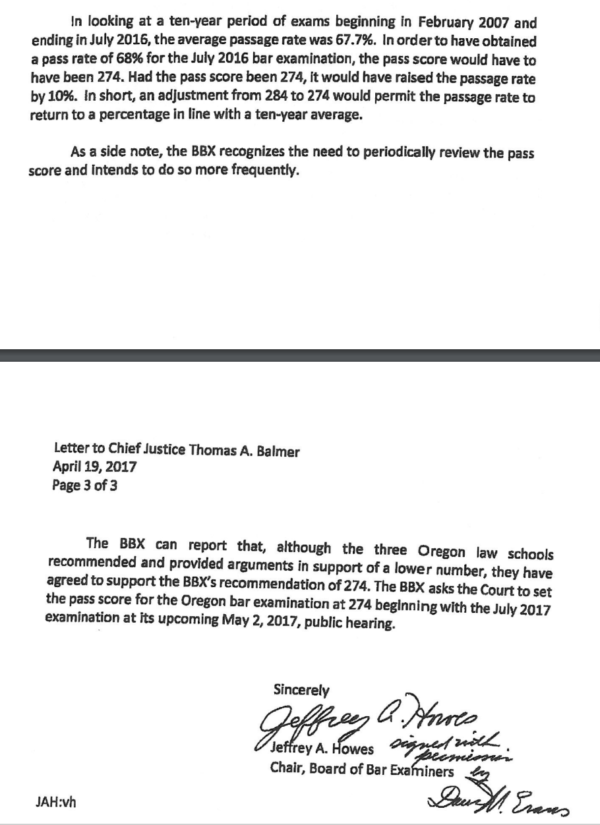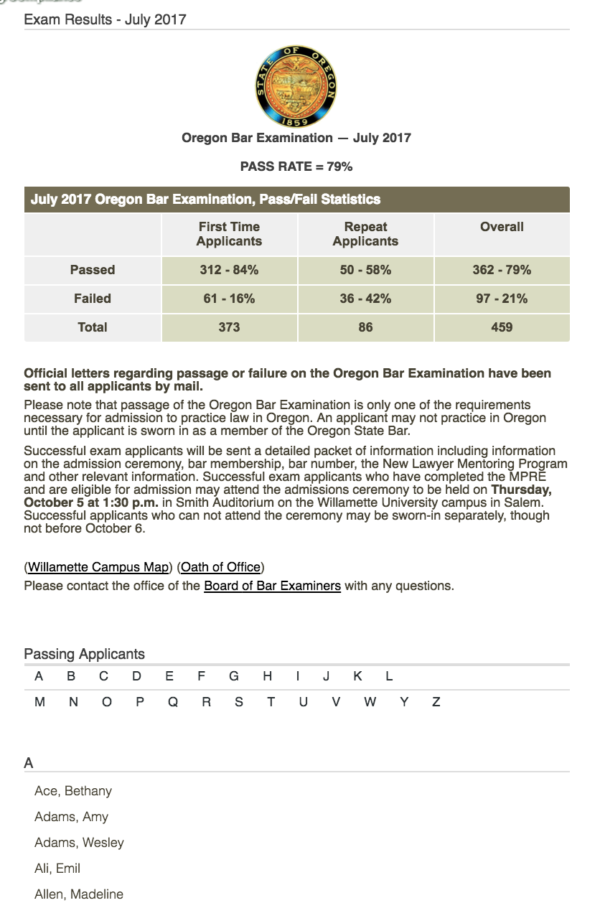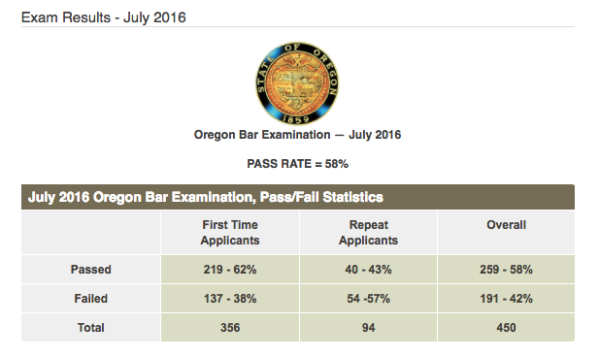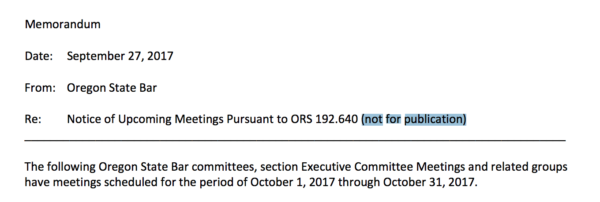Apparently Dean Lindner thinks he can, and Provost Banavar is backing him up. I’m wondering how we can recruit new faculty if they know that their job can be moved from, say, Eugene to Portland without their consent. This does not seem well thought out. Fortunately for the sake of…
Posts published by “UO Matters”
September 19, 2018 Dear University of Oregon faculty members, I am pleased to share with you some important information regarding the fiscal year 2019 salary increases for both represented and non-represented tenure-track faculty (TTF) and career non-tenure-track faculty (NTTF) at the University of Oregon. The fiscal year salary increases will…
I’m no slave to metrics, but who are you going to believe? Professor Christine Blasey, who’s most cited work is the very useful sounding Sage book on “Statistical Power Analysis in Research“, with 1343 citations since 2015: With increased emphasis on helping readers understand the context in which power calculations are done,…
Thanks to a helpful reader for the link. A snippet: These last few years have been tough for higher education. Enrollment is down year after year, state funding increases have stalled even as costs skyrocket, and most people don’t have much confidence overall in American colleges and universities. The standard explanation within academia for these…
A helpful reader notes this opinion piece from PNAS, asking if Knight Campus is a potential example of it: Opinion: Expansion fever and soft money plague the biomedical research enterprise, Henry R. Bourne Academic biomedical science has had both a long boom in its funding and a subsequent scary bust. From…
Just kidding, they don’t care about that kind of diversity. The Office of Equity and Inclusion has spent millions encouraging UO to hire faculty who look different but think the same. Apparently they’ve been very effective. Back in 2006 I matched the list of UO tenure track faculty with the…
He has, however, resigned as TrackTown President, right in the middle of planning for the 2021 IAAF Championships, and a federal investigation. Ken Goe has the scoop here: Lananna led the successful bid for the 2021 World Outdoor Championships, which are scheduled to be at Hayward Field. The bid is…
Dear CAS faculty and Staff, As you’re aware if you’ve walked down 13th Street between Chapman and Johnson, Tykeson Hall, the new home for CAS and a building that will offer integrated academic and career advising to UO students, is quickly rising. We expect Tykeson to open for classes in Winter…
Temperature and High-Stakes Cognitive Performance: Evidence from the National College Entrance Examination in China Joshua S. Graff Zivin, Yingquan Song, Qu Tang, Peng Zhang NBER Working Paper No. 24821. Issued in July 2018 NBER Program(s):Children, Development Economics, Environment and Energy Economics, Health Economics, Public Economics We provide the first nation-wide…
From around the o: Going forward, I have asked Kaia Rogers, Senior Director of Human Resources Programs, Services and Strategic Initiatives, and Missy Matella, Senior Director of Employee and Labor Relations to jointly assume leadership of the Human Resources department. Kaia will be overseeing operations in HR programs and services,…
Just in case any UO students, faculty, community members, the UO Senate, ASUO, the Eugene City Council, the Mayor, the Campus Planning Committee, or most longtime Eugene track and field fans had any illusions about what JH and the UO Foundation think of their importance. More in Meerah Powell’s Eugene…
Thought I’d repost this classic from last year. More related info soon. 2/15/2017 update: Here (gated if off campus). A snippet: The dust-up at the university began in November when Kenneth Jacoby, a reporter for the Daily Emerald student newspaper, filed two public-records requests for emails exchanged between several coaches…
12/12/2017: From the Oregonian, and also in the WaPo: Oregon’s Board of Examiners for Engineering and Land Surveying unconstitutionally applied state law governing engineering practice to Mats Järlström when he exercised his free speech about traffic lights and described himself as an engineer since he was doing so “in a noncommercial”…
7/24/2017 update: This university needs an effective office of Internal Audit to examine these sorts of bids. It took 5 weeks just to get an estimate from the VP for Equity and Diversity for the public records, and now the PRO refuses to waive their $114.62 fee: 07/21/2017 Dear Mr.…
9/27/2017 with 10/4 update:
Normally about 260 people pass the July Oregon Bar exam. This spring the Oregon Supreme Court dumbed down the pass score and made some other changes, and 360 people passed. Obviously this is good news for the 100 students who otherwise wouldn’t be licensed to practice law, and good news for the Oregon Bar, which collects an annual $470 from each. It’s bad news for those 260 students who would have passed the older, harder exam, and who now have to try and find a job in an even more flooded job market.
Oregon’s pass rate for the July exam, (all takers, not just UO students) has jumped from 58% last year to 79% this year. That’s a 21 percentage point increase or a (79-58)/58=36% increase in the success odds, in one year. In July 2016 the average pass rate for all US takers was 62%, compared to 58% for Oregon. So we were a little low, but not by much.
In July 2016, only Nebraska had a higher percentage of takers (82%) passing than Oregon’s 2017 new rate of 79%. (Kansas and Missouri were tied at 79%, Oregon’s new rate). See http://www.ncbex.org/pdfviewer/?file=%2Fdmsdocument%2F205 So, with one decision made without adequate prior public notice or discussion, and apparently with no discussion in the Oregon Supreme Court, Oregon has gone from being middle of the road to being among the four easiest states in which to get a license to practice law.
This is not what the Oregon Board of Bar Examiners intended. According to internal documents obtained with a public records request, the BBX believed these changes would increase the pass rate to about 68%. They explicitly rejected a proposal from the three deans of Oregon’s law schools for an even lower cut-score, apparently because they thought that would produce a pass rate of 78%, which they thought was too high. I wonder if the deans will now argue for raising the cut-score and lowering the pass rate?

(From the April 19 letter from BBX chair Jeffrey Howes to Oregon Chief SC Justice Thomas Balmer, at https://uomatters.com/wp-content/uploads/2017/08/Official-letters-to-Court-BBX-PubRcrdsReq-Aug-17.pdf)
In short Oregon’s new test, with the new lower cut-score, is much easier to pass than the old one, and much easier than the BBX led the Supreme Court to believe. It has given Oregon what is almost the highest pass rate in the country.
It’s true that the new exam will also make it easier for Oregon law students to move to other states, assuming their score was high enough to have passed those state’s cut-rate. But why is Oregon subsidizing the tuition of out-of-state students who will take out-of state legal jobs – if they can even find them?

For comparison, last July:

Michael Tobin has a brief report about this in the Daily Emerald, here.
10/4/2017 NOTE: I’ve now received two letters from the Oregon Bar, arguing that they did not break the public meetings law, while also promising that they will now post meeting notices on the bar’s website. As you can see from their October posting, they’re still trying to figure this transparency thing out:

…
I’ve got some more public records requests into them and the Oregon Supreme Court (which has updated its website and fixed some of its public records procedures in response to my previous questions to them) and I will post what I find out.
Posted 9/27/2017 and earlier: